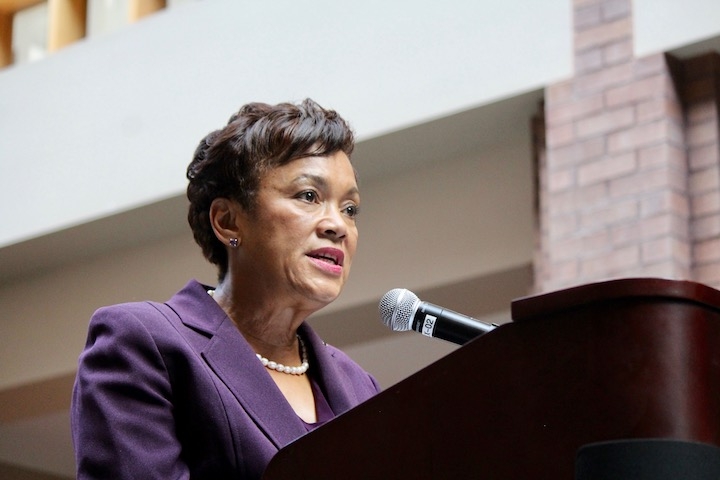
Markeshia Ricks Photo
Mayor Toni Harp.
A showdown looms between the Mayor Toni Harp and the Board of Alders, with the mayor vetoing portions of the legislature’s final version of the city budget.
The alders in turn have scheduled a special meeting for 7 p.m. Monday to consider overriding the veto.
Alders passed the final $538.9 million version of the budget June 5. It then went to Harp’s office for a final signature.
Instead, Harp exercised her right to veto parts of it. She explained her reasons in a four-page letter that was both emailed and sent in hard-copy form to the alders.
The alders need a two-thirds vote of the entire body — 20, no matter how many show up — to override the mayor.
In her letter, dated Thursday, Harp argued that the vetoed portions “would violate existing City Charter, state statute, ordinance, and contract provisions, and would expose the City to civil action and liability.” She also criticized the alders for not making those portions, passed as amendments to her proposed budget, public or sharing them with her staff before introducing and passing them on the floor of the board meeting.
Click here to read the full letter.
Board of Alders President Tyisha Walker and Majority Leader Alphonse Paolillo Jr. released the following joint statement in response to the mayor’s veto: “The Charter and Code of Ordinances of the City of New Haven is clear on the authority of the Board of Alders. We believe that we took actions consistent with that authority and in the best interest of our constituents.”
The dispute tests the parameters of legislative and executive power. They concern policy amendments through which the alders seek to exercise more control over setting salaries, government policies, and the corporation counsel office’s work on pending lawsuits, among other issues.
What The Alders Passed; What Harp Objected To
The alders passed the following amendments that Harp ended up vetoing included:
• Measures that would prevent the release of money for police and fire overtime above $1 million without new alder approval; require that the assistant police chief is in charge when the chief is out of town.
The final amended alder budget also bars the police department from spending money on salary increases for assistant chiefs until a new police union contract is settled. The department also is barred from spending on new lieutenant salaries or reassigning sergeants until a deployment plan for supervisors and patrol officers is presented and discussed with alders. Annex Alder Al Paolillo Jr. said the amendment’s purpose is to maintain “open lines of communication unlike with the past administration and to be crystal clear as to the direction of the department.”
Harp called these amendments an attempt to “directly administer the Police Department” in violation of powers clearly spelled out in the city charter. She said it would also “bring an unwelcome political dimension to key public safety staffing decisions.”
• A bid to require any proposed salary increases for executive management and confidential employees come before the board for approval.
Paolillo said the reason the charter requires the involvement of the Board of Alders in the budget process is “so that it can exercise its sound judgment as to whether or not certain costs and policies are reasonably necessary. The board is responsible for the total amount of money that needs to be spent. To ignore the requirements in that charter in that regard is to ignore the electors and approval — a situation expressly prohibited by the charter.”
Alders had raised objections to an unapproved raise for mayoral aide Jason Bartlett in particular.
Harp responded in her veto message that once the alders set acceptable salary ranges, they have no power over decisions made within those ranges.
• An amendment that would bar the corporation counsel from spending money for outside contracts until a summary report on investigation that has been requested by Board President Tyisha Walker provided; require the corporation counsel to forward all outside contracts to the board for an alder committee hearing prior to being entered into; and also bar the office from spending any city money until a report is produced on “all pending investigations, audits, reviews, inquiries concerning city departments that are currently underway.”
In her veto letter, Harp argued that the alders lack authority over how the corporation counsel spends its allotted budget and violates the confidentiality of information on pending investigations and lawsuits. The amendment would leave “pending legal cases … un-lawyered, resulting in” avoidable losses,” she wrote.
Harp responded that once the alders set acceptable salary ranges, they have no power over decisions made within those ranges.
• The sequestering of $1 million in approved Board of Education spending until the state completes its own budgeting process. New Haven, like other Connecticut cities, had by law to pass a new municipal budget without knowing how much state aid they’ll get.
That’s because the state legislature was unable to pass a new budget during a regular session as it faced a $5.1 billion two-year deficit. Legislators will meet again later this month to try again.
Meanwhile, the state has consistently cut millions of promised education aid dollars to the city already and may cut more.
The alders are seeking to have more say over how the eventual dollars are spent and important budget-cutting choices are taken.
Harp responded that the alders lack any legal authority to sequester education money. Unlike with other departments, the alders get once a year to vote up or down the entire education budget — and that’s it —with no line-item authority. The Board of Education, a state-chartered entity, crafts the detailed budget.